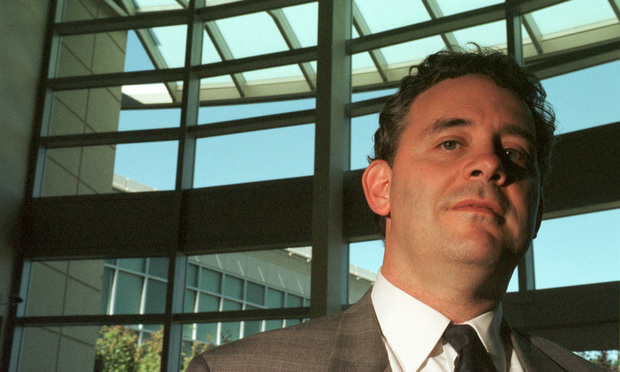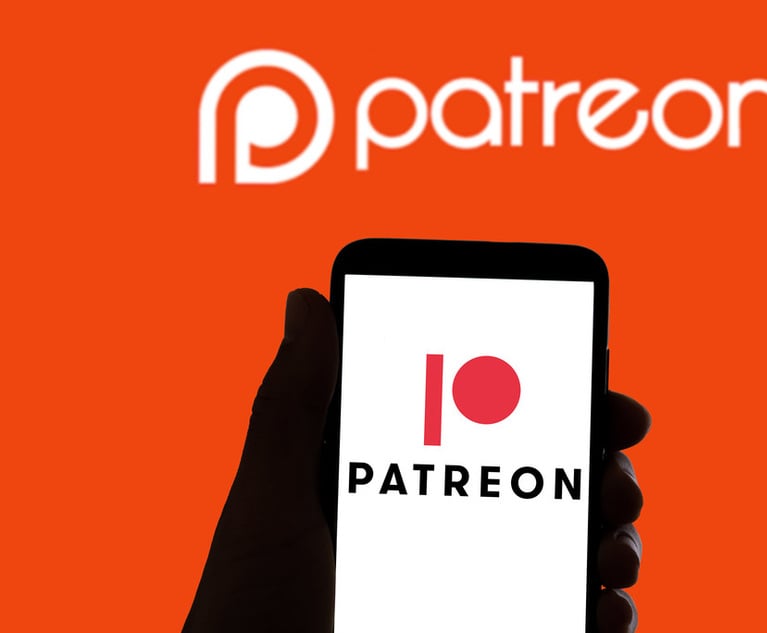InterDigital Wins Early Skirmish in FRAND Licensing Dispute
U.S. District Judge Cathy Ann Bencivengo denied cellular module maker u-blox's bid to enjoin InterDigital from contacting its customers while they hash out a dispute over 2G, 3G and 4G royaties.
January 31, 2019 at 06:56 PM
3 minute read
 Wilson Sonsini partner David Steuer
Wilson Sonsini partner David Steuer
U.S. District Judge Cathy Ann Bencivengo is not buying the FRAND-based injunction that u-blox and Sheppard, Mullin, Richter & Hampton are selling.
The Swiss developer of cellular modules sued IP licensing giant InterDigital Inc. on New Year's Day, and asked Bencivengo to prevent it from contacting u-blox's customers while the judge determines a fair, reasonable and non-discriminatory royalty on InterDigital's 2G, 3G and 4G patents.
Sheppard Mullin partner Stephen Korniczky argued Thursday that the last time u-blox's license expired, InterDigital notified u-blox customers that they were no longer covered by u-blox's license. That unfairly forced u-blox to choose between paying InterDigital “exorbitant” royalties or risk losing its customers.
But even before Korniczky stood to argue Thursday, Bencivengo made her feelings clear. “I have to say I'm unimpressed with the motion,” she said. A half hour later she'd formally denied it, handing InterDigital and Wilson Sonsini Goodrich & Rosati a decisive early win in a case that's drawn the interest of the Justice Department's antitrust division.
Bencivengo told Korniczky it would be equally unfair to preclude InterDigital from approaching anyone in u-blox's supply chain about practicing their patents without a license. Such contacts might make u-blox uncomfortable, “but I don't know that that's a legal ground to stop them from enforcing their patents,” she said.
Korniczky stressed that u-blox is a willing licensee, and the only dispute is over the royalty rate, which the court will decide. InterDigital has committed to the European Telecommunication Standards Institute that it will license its standard-essential patents on FRAND terms, and u-blox shouldn't have to pay more than that while the case is litigated, he argued.
But neither should InterDigital forgo payments altogether while u-blox practices its patents, Bencivengo said. “You just want to practice the patents without a license in the hope that you'll reach a deal later,” she said.
Wilson Sonsini partner David Steuer, who had argued in his briefs that u-blox is seeking an unconstitutional prior restraint on its speech, didn't have to say much Thursday. He told Bencivengo that his client is not a “bully” or “shakedown” artist, as u-blox has alleged. In fact, the company is willing to submit the FRAND royalty issue to arbitration if u-blox wants a quick decision, he said.
Also appearing for InterDigital on Thursday were Wilson Sonsini partners Michael Levin and Maura Rees and of counsel Natalie Morgan.
InterDigital also had support from DOJ's antitrust division. Although u-blox had disclaimed its antitrust cause of action for purposes of Thursday's hearing, the division filed a statement of interest Tuesday critiquing u-blox's motion.
Bencivengo said she'll issue a written order but made clear that she will be denying the injunction based on all four eBay elements. She invited the parties to jointly propose a special master to take evidence on the FRAND royalty issue and submit a report and recommendation.
This content has been archived. It is available through our partners, LexisNexis® and Bloomberg Law.
To view this content, please continue to their sites.
Not a Lexis Subscriber?
Subscribe Now
Not a Bloomberg Law Subscriber?
Subscribe Now
NOT FOR REPRINT
© 2025 ALM Global, LLC, All Rights Reserved. Request academic re-use from www.copyright.com. All other uses, submit a request to [email protected]. For more information visit Asset & Logo Licensing.
You Might Like
View All
'A Death Sentence for TikTok'?: Litigators and Experts Weigh Impact of Potential Ban on Creators and Data Privacy

‘Extremely Disturbing’: AI Firms Face Class Action by ‘Taskers’ Exposed to Traumatic Content
5 minute read

Patreon Hit With Lawsuit for Allegedly Diverting Subscriber Data to Meta
Trending Stories
- 1'A Death Sentence for TikTok'?: Litigators and Experts Weigh Impact of Potential Ban on Creators and Data Privacy
- 2Bribery Case Against Former Lt. Gov. Brian Benjamin Is Dropped
- 3‘Extremely Disturbing’: AI Firms Face Class Action by ‘Taskers’ Exposed to Traumatic Content
- 4State Appeals Court Revives BraunHagey Lawsuit Alleging $4.2M Unlawful Wire to China
- 5Invoking Trump, AG Bonta Reminds Lawyers of Duties to Noncitizens in Plea Dealing
Who Got The Work
J. Brugh Lower of Gibbons has entered an appearance for industrial equipment supplier Devco Corporation in a pending trademark infringement lawsuit. The suit, accusing the defendant of selling knock-off Graco products, was filed Dec. 18 in New Jersey District Court by Rivkin Radler on behalf of Graco Inc. and Graco Minnesota. The case, assigned to U.S. District Judge Zahid N. Quraishi, is 3:24-cv-11294, Graco Inc. et al v. Devco Corporation.
Who Got The Work
Rebecca Maller-Stein and Kent A. Yalowitz of Arnold & Porter Kaye Scholer have entered their appearances for Hanaco Venture Capital and its executives, Lior Prosor and David Frankel, in a pending securities lawsuit. The action, filed on Dec. 24 in New York Southern District Court by Zell, Aron & Co. on behalf of Goldeneye Advisors, accuses the defendants of negligently and fraudulently managing the plaintiff's $1 million investment. The case, assigned to U.S. District Judge Vernon S. Broderick, is 1:24-cv-09918, Goldeneye Advisors, LLC v. Hanaco Venture Capital, Ltd. et al.
Who Got The Work
Attorneys from A&O Shearman has stepped in as defense counsel for Toronto-Dominion Bank and other defendants in a pending securities class action. The suit, filed Dec. 11 in New York Southern District Court by Bleichmar Fonti & Auld, accuses the defendants of concealing the bank's 'pervasive' deficiencies in regards to its compliance with the Bank Secrecy Act and the quality of its anti-money laundering controls. The case, assigned to U.S. District Judge Arun Subramanian, is 1:24-cv-09445, Gonzalez v. The Toronto-Dominion Bank et al.
Who Got The Work
Crown Castle International, a Pennsylvania company providing shared communications infrastructure, has turned to Luke D. Wolf of Gordon Rees Scully Mansukhani to fend off a pending breach-of-contract lawsuit. The court action, filed Nov. 25 in Michigan Eastern District Court by Hooper Hathaway PC on behalf of The Town Residences LLC, accuses Crown Castle of failing to transfer approximately $30,000 in utility payments from T-Mobile in breach of a roof-top lease and assignment agreement. The case, assigned to U.S. District Judge Susan K. Declercq, is 2:24-cv-13131, The Town Residences LLC v. T-Mobile US, Inc. et al.
Who Got The Work
Wilfred P. Coronato and Daniel M. Schwartz of McCarter & English have stepped in as defense counsel to Electrolux Home Products Inc. in a pending product liability lawsuit. The court action, filed Nov. 26 in New York Eastern District Court by Poulos Lopiccolo PC and Nagel Rice LLP on behalf of David Stern, alleges that the defendant's refrigerators’ drawers and shelving repeatedly break and fall apart within months after purchase. The case, assigned to U.S. District Judge Joan M. Azrack, is 2:24-cv-08204, Stern v. Electrolux Home Products, Inc.
Featured Firms
Law Offices of Gary Martin Hays & Associates, P.C.
(470) 294-1674
Law Offices of Mark E. Salomone
(857) 444-6468
Smith & Hassler
(713) 739-1250






